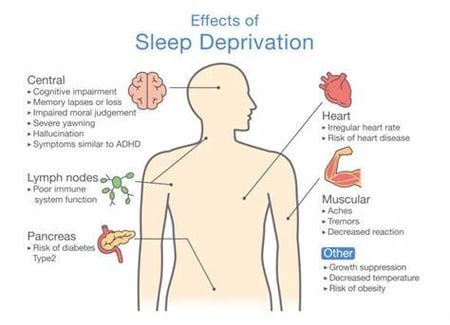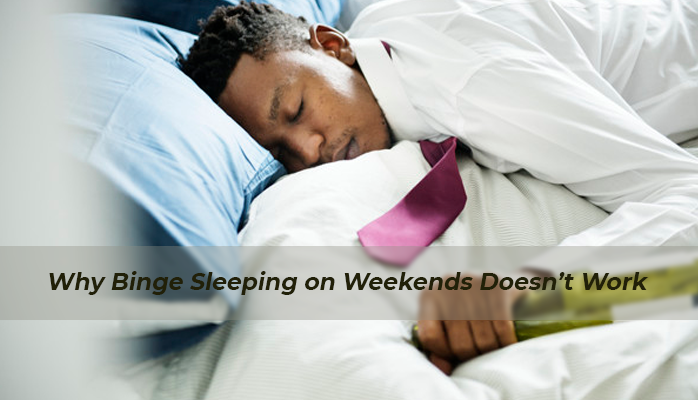What is Binge Sleeping?
Imagine this scenario: you stay up late during the week, engrossed in reading, watching TV, working, or browsing on your computer. The next morning, you drag yourself out of bed, having only managed about five hours of sleep. But don't worry, you think, you can always catch up on sleep over the weekend.
On the weekends, you indulge in a bit of extra sleep, thinking it's the perfect solution to make up for those lost hours of rest. This practice is quite common among many individuals, especially considering that Americans typically clock in 6.8 hours of sleep on weekdays and 7.4 hours on weekends.
The concept of binge sleeping revolves around the notion of a "sleep debt," a fundamental concept crucial in understanding the effects of sleep deprivation and binge sleeping patterns.
What is Sleep Debt?
The concept of a sleep debt is quite simple yet crucial to grasp:
Your body has a specific sleep requirement, which varies based on your age. When you consistently fall short of this needed rest, you enter a state of sleep deprivation. This deprivation accumulates like a "debt," which must be repaid by ensuring you get more sleep than your usual quota. Understanding the dynamics of sleep debts is vital, as there are common misconceptions about what they entail and how you can effectively "pay them off."
How You Repay Your Sleep Debt
To start off, the concept of a sleep debt is not as straightforward as a financial debt – you can't simply repay it all at once. Let's break it down:
If your body needs 7 hours of sleep for optimal rest,
and you only get 6 hours per night from Monday to Friday, creating a "debt" of 5 hours,
sleeping a few extra hours on Friday and Saturday nights won't erase that sleep debt.
Research indicates that one or two nights of extended sleep are not enough to reverse the effects of sleep deprivation.
The key to repaying your sleep debt lies in establishing a consistent and healthy sleep routine. In the same scenario, here's how you can effectively repay your sleep debt:
Catch up on sleep over the weekend
Ensure you get sufficient or slightly extra sleep each day in the following week
In essence, overcoming sleep deprivation requires a regular pattern of restful and adequate sleep.
Why Binge Sleeping Doesn’t Work
If it isn’t clear yet, the reason binge sleep doesn’t work is that your brain doesn’t respond to loss of sleep like a money debt. You can’t just “repay” your debt and suddenly be okay. You repay your debt by establishing a consistent pattern of getting enough sleep.
So if you binge sleep on the weekend, you might feel good in the hours after you wake, but the effects of sleep deprivation will remain.
How Much Sleep Do We Need?
Commonly expected ranges of sleep we need are [National Sleep Foundation]:
- <1 year: 12-17 hours per day (more sleep for newborns than toddlers)
- 1-2 years: 11-14 hours
- 3-5 years: 10-13 hours
- 6-13 hours: 9-11 hours
- 14-17 hours: 8-10 hours
- 18-65: 7-9 hours
- 65+: 7-8 hours
Of course, we are all individuals and your sleep requirements may differ from these. These are simply some guidelines.
Effects of Sleep Deprivation
 Sleep deprivation causes lower performance physically, emotionally, and mentally. Some specific effects are:
Sleep deprivation causes lower performance physically, emotionally, and mentally. Some specific effects are:
- Lower sex drive
- Less able to manage stress and anxiety
- Less likely to get requisite exercise due to fatigue
- Underperform at work, school, etc.
- Chronic irritability that can interfere with relationships
- Less engagement in activities
- More brain fog and general apathy
- The emotional impact of general inactivity due to fatigue
Persistent lack of sleep can leave you feeling out of sorts, like a shadow of your usual self. Over time, these sensations and physical signs of sleep deprivation can take a toll on both your emotional and physical well-being. When combined with other symptoms, this can potentially lead to feelings of depression.
Sleeping Disorder that Cause Sleep Deprivation
Sleeping disorders can lead to sleep deprivation if not treated. Some of the most common sleep disorders that generally result in chronic and sometimes severe sleep deprivation are:
- Sleep apnea
- Insomnia
- Restless leg syndrome
- Circadian rhythm disorders
If you are struggling with chronic sleep deprivation, please contact us or take a free online sleep test by clicking the orange button below.


